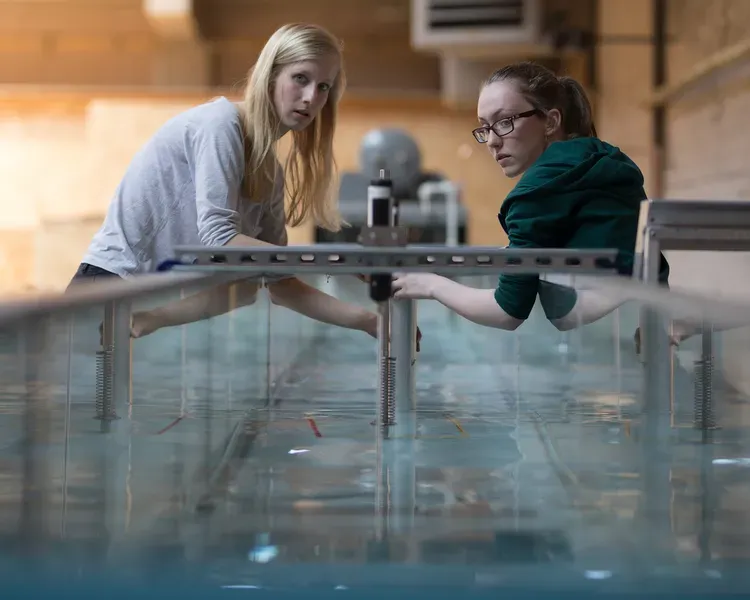Future Infrastructure and Environment
Information on the research and impact of Future Infrastructure and Environment studies at the University of Dundee.

The aim of this research cluster is to conduct world-leading research that is both fundamental and applied in nature, and aligned to the thematic areas of Energy, Global Uncertainties, Living with Environmental Change, and working towards "Net Zero" within a sustainability framework.
Research in this cluster includes:
- urban, coastal and offshore resilience and adaptation to natural and anthropomorphic hazards, including those fed by climate change (extreme weather, flooding, tsunami, blast and earthquakes);
- low carbon materials and infrastructure, including green infrastructure, recycling and re-use of waste products in construction, and the assessment, repair and life extension of ageing infrastructure
- provision of renewable energy, including ocean engineering (marine hydrodynamics, fluid-soil-structure interactions, offshore renewable energy geotechnics and coastal engineering) as well as studying buildings as power stations (such as functionalised foundations and ground-source heat)
- protection of the environment, including environmental fluid mechanics and geophysical flows, the engineering of sustainable aquaculture and the development of low-impact design and construction processes
The applied research in these areas is underpinned by fundamental work looking at the constitutive modelling of structural and geotechnical materials and developing advanced computational modelling techniques for solid and particulate materials and fluids.
A strong emphasis is placed on exploiting interdisciplinary research opportunities through research group collaboration within the cluster – the Concrete Technology, Structural Engineering, Geotechnical Engineering, and Fluid Mechanics groupings – and with other School clusters, as well as exploiting cross-school links (including with Social Sciences and Architecture & Urban Planning).
Impact
The cluster engage with companies and organisations to translate our research through direct contracts or funded projects. Examples include:
- InterMoor Limited (next generation drag embedment anchors for offshore floating wind)
- Heerema Marine Contractors (novel silent foundation types for offshore wind)
- Corpower Ocean & Ternan Energy (novel anchors for offshore wave energy)
- Mineral Products Association (low carbon concrete)
- TechnipFMC (dynamic analysis of suction pile foundations for energy applications)
- Norwegian Public Roads Authority (minimising environmental risks from fine sediments and plastic debris during rock dumping operations in Sørfjorden)
- Scottish and Southern Energy Networks (new design and construction enhancements to reduce the carbon footprint of new and refurbishment OLE foundations)
The cluster are currently developing avenues for impact including enabling technologies for commercially viable deep-water marine and floating renewable energy, with opportunities around the development of innovative construction techniques and composite materials, substructures, foundations and anchoring technologies. Other impact will be realised by contributing to the sustainable development in the Scottish aquaculture sector through testing new salmon cage designs and informing enhanced predictive modelling of aquaculture waste dispersal and sea/loch bed environmental impacts.
Contribution to the strategic themes
Ensuring Environmental Sustainability – advance environmentally-sustainable construction, repair and rehabilitation technologies for the built and natural environments through growth in developing low carbon materials and design approaches towards a net-zero future, including: development of benchmarks to drive improved performance in construction projects; development of low-cost screw-pile foundation technology for solar/wind energy that is resilient to natural hazards for deployment in developing countries and the renewables sector as a whole; promoting the use of wastepaper sludge within the manufacture of cementitious products; creating low-carbon composite materials for sustainable infrastructure incorporating re-use of waste materials; development of in-situ test devices used for measuring rooted soil strength at forested sites for stability assessments.
Research cluster lead
Membership
- Ahmed Alagha
- Alan Cuthbertson
- Andrew Brennan
- Anirban Guha
- Christos Mourlas
- Craig Davidson
- Gloria Guan
- Hing-Ho Tsang
- Jonathan Knappett
- Jorge Sandoval
- Judith Halliday
- Kate Ward
- Laszlo Csetenyi
- Leon Chernin
- Margi Vilnay
- Masoud Hayatdavoodi
- Matteo Ciantia
- Michael Brown
- Michael McCarthy
- Moray Newlands
- Paula Stella de Viveiros Teixeira
- PengPeng He
- Rod Jones
- Scott Robinson
- Tom Dyer
- Tom Eaves
- Xuemei Lin
- Yanfei Yue